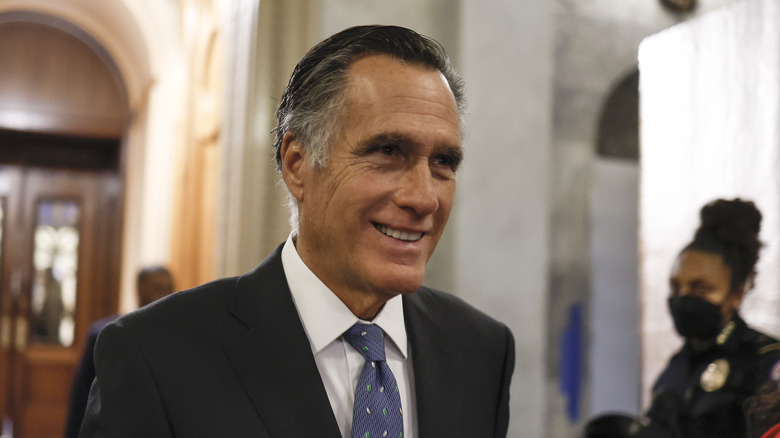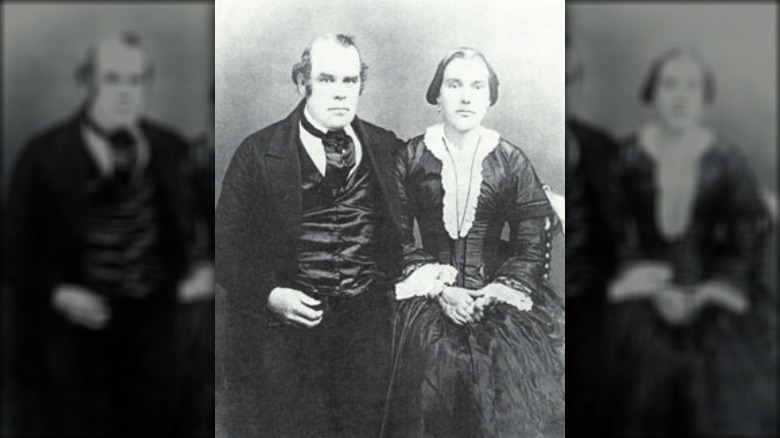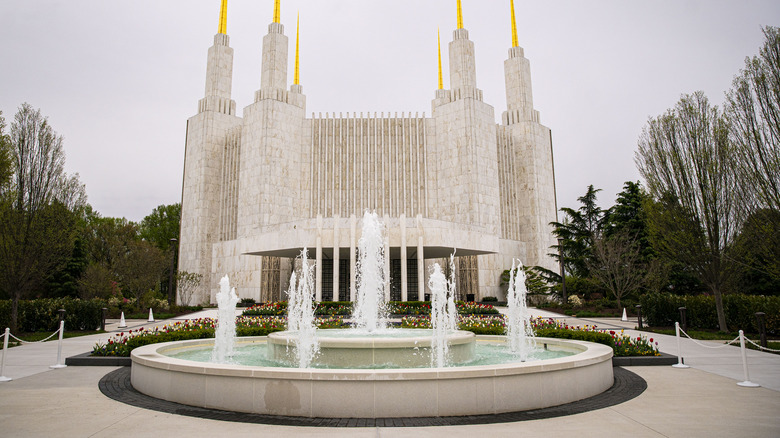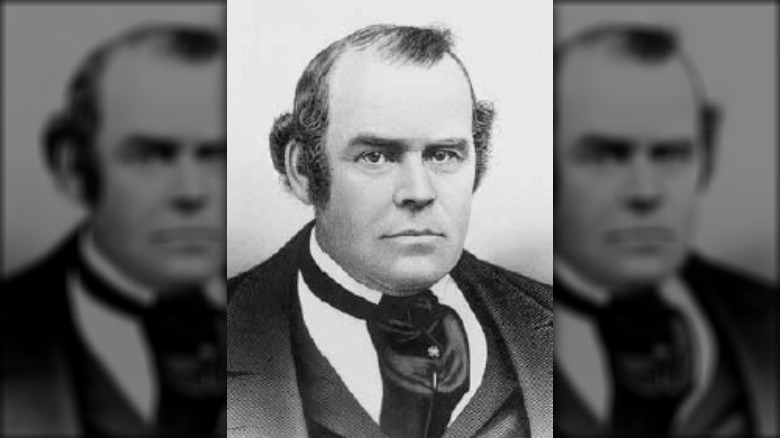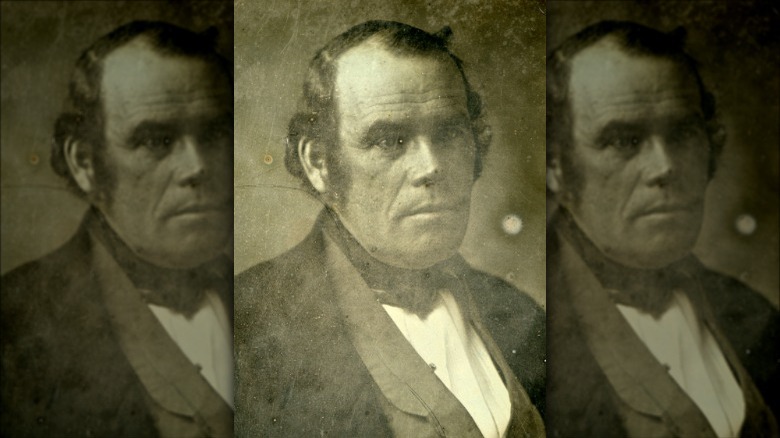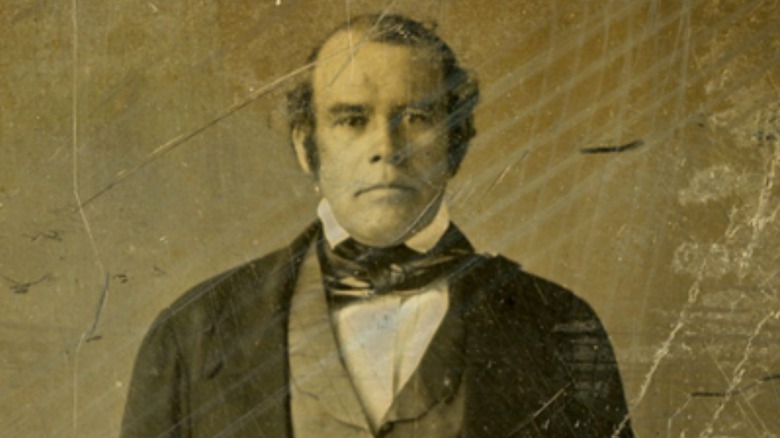The Violent Murder Of Mitt Romney's Great-Great-Grandfather
Parley Parker Pratt, born April 12, 1807, in Burlington, New York, is a famous and celebrated name among members of the Church of Latter-Day Saints. As an early convert to Mormonism, Pratt became a powerful and effective evangelist for the church, writing poetry, sermons, and books that effectively channeled his beliefs into uplifting and convincing doctrine. Pratt was also a missionary who spent two years in Great Britain spreading the word of Mormonism, and throughout his life he sought to convert the people he encountered across the United States and beyond.
Pratt's influence on Mormonism and his effect on its spread was so great that the founder of the Church, Joseph Smith, named him as one of the Quorum of the Twelve Apostles, a truly honored position within Mormonism. Indeed, he is still deemed a decisive figure in the movement today — theologians have compared him to the Apostle Paul in wider Christianity. He is remembered today also as the great-great-grandfather of Mitt Romney, the senator who ran as the Republican presidential nominee in 2012.
But Pratt is also a controversial figure, whose unconventional attitude toward marriage — which, depending on your point of view, might be described as "pluralist," "polygamist," or "bigamist" in nature — attracted opprobrium in his lifetime and has been debated both within the Mormon church and outside ever since. It was Pratt's polygamy, too, which led to his brutal death in 1857 at the hands of the estranged first husband of one of Pratt's wives.
Parley P. Pratt: professed polygamist
The practice of polygamy — which Mormons at the time named "polygyny" or "plural marriage" — was a common part of life in the Church of Latter-Day Saints in the 19th century. Though it varied from area to area and from decade to decade (polygamy in the Mormon community only really became a widely known phenomenon toward the end of the 1850s), it was typical for many Mormon men to marry two wives.
As an early evangelist for the church, however, Parley Parker Pratt did more than practice polygamy: He was, in effect, the architect of how plural marriage was practiced in the church. In 1844, Pratt published an essay — "Intelligence and Affection" — which went further than the teachings of the church's founder, Joseph Smith, and outlined polygamy as a "celebration of divine physicality." Pratt himself would go on to have a total of 12 wives, with the last union precipitating his violent death.
Not that having multiple wives as a part of one's faith was readily accepted in wider America. As irreconcilable as it seems today, critics of Mormon polygamy compared it to slavery in terms of its "barbarism," identifying it as one of the most corruptive practices in the country at the time.
[Featured image via Wikimedia Commons | Cropped and scaled]
Marriage to his 12th wife, Eleanor McLean
Parley Parker Pratt's missionary work took him as far afield as Chile and Great Britain, spreading the word of Mormonism and seeking converts to the church. A number of these converts went on to be his wives.
In 1855, Pratt was traveling through California, spending time doing missionary work in San Francisco when he encountered a woman named Eleanor McLean, the woman who would become his 12th and final wife. McLean was a recent convert to Mormonism, and upon Partt's arrival in the city she became close with his family — especially one of his wives, Elizabeth, whom she cared for when she fell sick in the city.
At the time of her betrothal to Pratt, Eleanor was still married. She claimed, however, that her husband, Hector McLean, was abusive to her and addicted to alcohol, and that the Pratt family had effectively rescued her from the relationship.
If you or someone you know is dealing with domestic abuse, you can call the National Domestic Violence Hotline at 1−800−799−7233. You can also find more information, resources, and support at their website.
Parley P. Pratt vs. Hector McLean
The exact nature of Hector McLean's marriage to Eleanor and their estrangement have been characterized in various ways in reports of the events that led to Hector killing Parley Parker Pratt. While Eleanor claimed Hector was abusive and that Pratt had liberated her, anti-polygamy news outlets later argued that Pratt had unlawfully stolen Eleanor away from her legal spouse. Some stories say that McLean was a postal inspector who intercepted a letter between Eleanor and Pratt and learned of their relationship — though this detail has been challenged by historians.
Nevertheless, it seems that as the McLeans' marriage fell apart, Hector made the decision to send their children away from the family home in San Francisco to live with family in New Orleans, which precipitated Eleanor's abandoning of the marriage. Though she planned to escape Hector by leaving with Pratt to live in Utah once she had reclaimed her children, Hector managed to catch up to the party in Arkansas, where he set about taking the children back once more and attempted to have Eleanor and Pratt imprisoned.
[Featured image by Charles Roscoe Savage via Wikimedia Commons | Cropped and scaled]
The murder of Parley P. Pratt
Parley Parker Pratt and Eleanor McLean were both arrested in Arkansas, the latter on suspicion of stealing clothes for her children. At the same time, news broke in the press that Pratt had broken up a legal marriage, which historians suggest may have enraged Hector McLean further. With public animosity against the Mormon Apostle growing, Pratt's trial was postponed by the authorities, and he was released on May 13, 1857 after a night in the cells. Hector, however, learned that Pratt was free and pursued him. Upon catching up with the missionary, Hector and a posse of his supporters repeatedly shot and stabbed Pratt, who died of his injuries an hour later. In his final minutes, the Apostle declared himself a Mormon martyr.
Though McLean was undoubtedly the perpetrator of Pratt's murder, he was shockingly never tried for the killing and walked thanks to American society's intense distaste for the Mormon practice of polygamy at the time. In fact, numerous newspapers praised Pratt's killer for taking justice into his own hands in his bloody retribution against the man who had stolen his legal spouse.
Pratt reportedly requested that his remains be returned to his home in Utah for burial. However, his ultimate resting place is somewhere in Wynn Cemetery in Fine Springs, Arkansas, not far from the scene of his murder. The exact location of where he was interred is currently unknown.
[Featured image by Church History Library via Wikimedia Commons | Cropped and scaled]
Legacy
It has been suggested by some historians that Parley Pratt's murder led to further horrifying bloodshed: The Mountain Meadows Massacre, when a band of Mormons and Native Americans killed a group of migrants four months after the Latter-Day Saints Apostle's death. However, the linking of the two events is still debated.
In 1862, Congress passed the Morrill Anti-Bigamy Act, effectively outlawing plural marriage, which the church distanced itself from in 1890. Pratt, however, remains an admired figure in the Mormon church, with his writings and songs still very much in use by Mormon theologians and in church services. Pratt is also known outside of the Church of Latter-Day Saints for being the great-great-grandfather of the prominent Senator Mitt Romney, also a Mormon. Romney gained lasting fame after securing the Republican nomination for the 2012 Presidential Election, though he lost out to Democratic President Barack Obama, who secured a second term.
